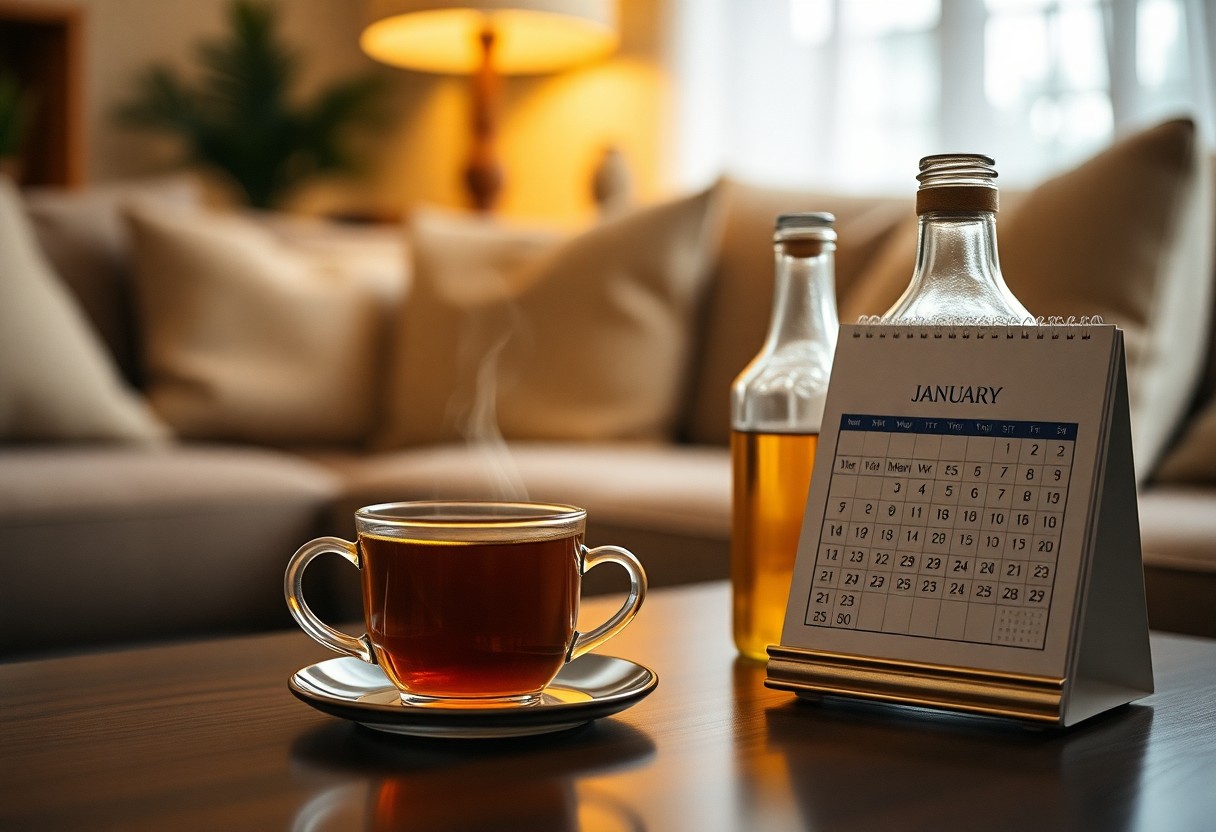Damp January, a concept gaining traction, encourages you to reassess your relationship with alcohol by reducing your intake without complete abstinence. This approach allows you to engage in a more mindful drinking experience, helping you identify your habits and triggers while fostering healthier choices. By participating in Damp January, you can discover how small adjustments in your drinking patterns can positively impact your overall well-being, both physically and mentally. Embracing a damp mindset may empower you to enjoy social situations without relying on alcohol as your primary source of enjoyment.
Defining Damp January
Before you decide to launch on a journey of self-discovery regarding your alcohol consumption, understanding what Damp January entails is important. This concept offers a flexible approach to drinking, allowing you to cut back on alcohol without complete abstinence, making it a more manageable alternative for those who find quitting cold turkey too challenging.
Understanding the Concept
Any journey towards mindful drinking starts with the Damp January approach, which varies from person to person. It invites you to experiment with reduced drinking patterns, helping you assess your habits and build a healthier relationship with alcohol.
Differences from Dry January
Any consideration of Damp January highlights its contrast with Dry January, where the latter demands complete abstinence from alcohol for 31 days. Instead, Damp January allows you to enjoy occasional drinks, making the transition to reduced intake feel less restrictive.
It’s important to recognize that while Dry January involves total sobriety, Damp January focuses on moderation and self-exploration. This flexibility can make your experience more sustainable and enjoyable, allowing you to implement manageable changes to your drinking habits without feeling deprived or overwhelmed.
Benefits of Damp January
Some of the benefits of participating in Damp January include improved well-being and a more thoughtful relationship with alcohol. By reducing your intake during this month, you may experience better sleep quality, increased energy levels, and enhanced mood. These positive effects can help reignite your motivation to prioritize health and self-care long after January ends.
Mental and Physical Health
Below are some notable mental and physical health benefits associated with Damp January. Many individuals find that cutting back on alcohol leads to improved focus, reduced anxiety, and better overall physical health. By making conscious decisions about your alcohol consumption, you set a foundation for regular self-reflection and growth.
Encouraging Moderation
On the other hand, Damp January fosters moderation instead of complete abstinence, making it a more approachable alternative for many. This shift allows you to understand your drinking habits and adjust them in a sustainable manner. Moderation can also prevent the potential rebound effect often seen with strict abstinence, where individuals may return to heavy drinking once the period ends.
Even small adjustments can lead to long-lasting changes in your drinking behavior. Embracing a more mindful approach during Damp January provides you an opportunity to experiment with moderation and discover healthier alternatives. You may find that by choosing to drink less frequently or in smaller amounts, you not only feel better but also gain a deeper awareness of your drinking patterns and triggers.
Assessing Your Relationship with Alcohol
Any effort to evaluate your relationship with alcohol can pave the way for a healthier lifestyle. Engaging in Damp January provides an opportunity to take a step back and consider how alcohol fits into your life, what role it plays in your social interactions, and how it may affect your well-being. This period of reflection can help you make informed decisions about your drinking habits, leading to long-term benefits for your physical and mental health.
Self-Reflection and Mindfulness
Below, consider incorporating mindfulness into your routine during this period. Practicing self-awareness helps you understand your motivations for drinking and encourages you to reflect on your experiences without judgment. Simple practices, such as journaling or meditation, can help illuminate the connections between your emotions and drinking habits, fostering a deeper understanding of your choices.
Identifying Triggers
After establishing a self-reflective practice, you should focus on identifying triggers that lead to alcohol consumption. By recognizing situations or emotions that prompt you to drink, you can better navigate these challenges and develop healthier coping strategies.
Also, being aware of your environmental and emotional triggers can significantly aid in reducing your alcohol intake. For instance, social gatherings, stress, or boredom may prompt you to reach for a drink. By pinpointing these triggers during Damp January, you can experiment with substituting alcohol with healthier alternatives, like herbal teas or engaging activities, enhancing your overall sense of well-being.

Strategies for Implementing Damp January
Many individuals seeking to rethink their relationship with alcohol can benefit from practical strategies during a damp January. Establishing a mindful approach to consumption can enhance your physical and mental well-being while keeping the experience enjoyable and relatable. This journey allows for personal introspection and ultimately assists in making informed decisions about drinking habits.
Setting Clear Goals
Against ambiguity in your intentions, it’s important to set specific, realistic goals for your damp January. Whether you aim to reduce your drinking by a set number of days or limit alcohol to weekends, clarity will empower your decision-making process and foster successful outcomes.
Utilizing Support Systems
By engaging with supportive communities or friends, you significantly enhance your damp January experience. Having a partner or group can share experiences, motivation, and encouragement as you navigate through this transformative month.
Setting up your support system can take many forms, from joining online communities like Reframe or Club Soda to simply enlisting a friend to join you in your journey. This shared accountability will help you stay committed to your goals and even encourage more non-drinking social events. Participating in a group or community not only provides motivation but can foster meaningful connections, making the journey feel less isolating as you explore new ways to enjoy life without the need for alcohol.
Alternatives to Alcohol
Your journey through a damp January can include various enjoyable alternatives that help redefine your relationship with drinking. Exploring non-alcoholic options not only allows you to engage socially without the pressure to consume alcohol, but it also presents an opportunity to discover new flavors and experiences that may become your go-to choices.
Non-Alcoholic Options
Options such as sparkling waters, herbal teas, and creative mocktails offer a satisfying substitute for alcoholic beverages. Brands now offer a wide selection of non-alcoholic beers, wines, and spirits that mimic traditional drinks without the alcohol content, making it easier for you to socialize without sacrificing flavor or enjoyment.
Enjoying Social Activities
Among the many benefits of participating in a damp January is the chance to enjoy social activities without the expectation of drinking. By embracing non-alcoholic beverages at gatherings, you can focus on meaningful interactions and build stronger connections with friends and family.
Social environments can often revolve around alcohol; however, opting for non-alcoholic options opens the door to diverse engagements. You might consider hosting game nights, attending community events, or exploring new hobbies that don’t center on drinking. By redistributing your attention toward social engagement and connection, you can foster a healthier and more fulfilling lifestyle beyond your drinking habits.

Seeking Professional Support
Despite the benefits of trying damp January, there may be instances where cutting back proves difficult. If you find yourself struggling to moderate your alcohol consumption, seeking professional support can provide you with tailored strategies and accountability. Licensed medical professionals and addiction psychiatrists can help you navigate your relationship with alcohol, ensuring a safer and more effective approach to reducing your intake.
When to Consult a Specialist
To determine if it’s time to consult a specialist, evaluate your relationship with alcohol honestly. If you experience withdrawal symptoms, rely on alcohol to cope, or find yourself drinking more than intended, these are indicators that professional help may be necessary.
Resources Available
Among the various resources you can explore are support groups, apps, and counseling services tailored to those looking to moderate their drinking. Organizations like Reframe and Alcohol Experiment offer assistance through community engagement and guided experiences.
Even with support from friends and family, professional resources provide a structured approach to achieving your goals. Online platforms like Reframe utilize neuroscience to encourage sustainable behavior changes, while local support groups foster communal understanding and shared experiences. These tools can be instrumental in helping you develop a healthier relationship with alcohol during your damp January journey.
Conclusion
As a reminder, engaging in Damp January can serve as a valuable opportunity for you to reassess your relationship with alcohol. By consciously moderating your intake rather than eliminating it, you can gain insights into your drinking habits and their effects on your physical and mental well-being. This approach allows you to make informed choices, promoting a healthier lifestyle that aligns with your personal goals regarding alcohol consumption.


